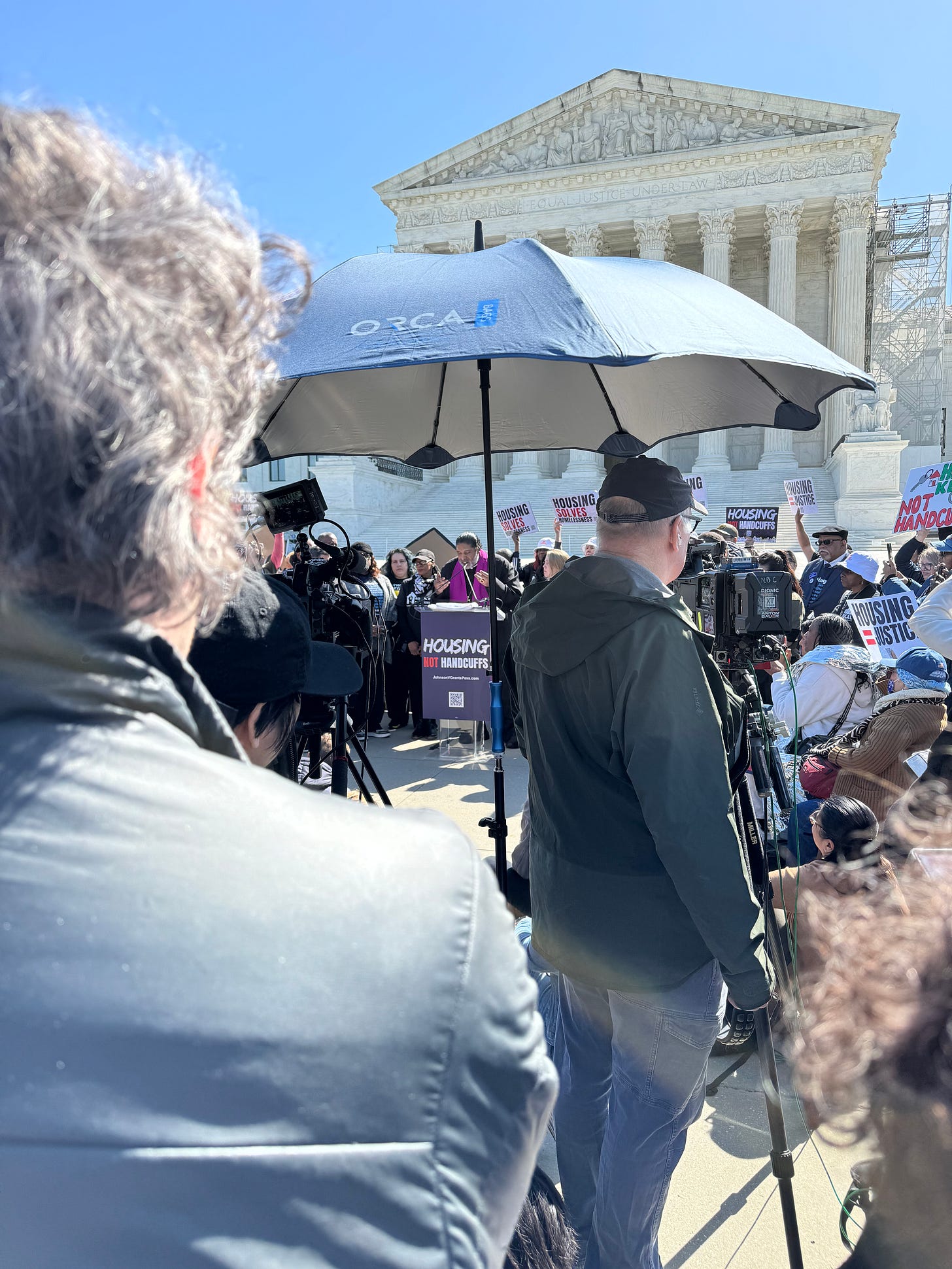This morning, I joined a crowd of people outside the Supreme Court in Washington, D.C., to advocate for the recognition of housing as a human right.
We stood together to affirm the dignity of those without addresses, emphasizing that homelessness should not be criminalized in one of the wealthiest countries in the world. Why were we there? Because the Supreme Court was set to hear one of the most significant cases in the history of homelessness: Grant Pass v. Johnson.

Grant Pass v. Johnson originated from a legal challenge by the unhoused against the city of Grants Pass, Oregon. The plaintiffs contested city ordinances that fined behaviors associated with homelessness, such as sleeping outdoors when no alternative shelter was available.1
After the Ninth Circuit Court ruled in favor of the people experiencing homelessness, confirming that such penalties were unconstitutional under the Eighth Amendment, the city of Grants Pass appealed the decision.2
This led to the case being brought to the Supreme Court, which is set to decide whether such laws, when shelter is insufficient, violate constitutional protections against cruel and unusual punishment.3

As I stood with advocates from all around the country, we reflected on how the decision would determine whether the criminalization of those who are unhoused is constitutional.
Here’s why I believe this is deeply problematic:
Unjust Criminalization: If the Supreme Court rules that it was right to criminalize and shut down encampments of those who are unhoused while knowing there are not enough beds, it opens doors for homelessness to become a crime across the country: meaning to be unhoused will be a crime.
Humanity and Stigma: Criminalization would place a permanent stain on the humanity of those who experience homelessness, further perpetuating the narrative that the poor and unhoused are to be discarded.
Targeting Supporters: It harms organizations and people who support those who are unhoused by making them targets.
Misguided Solutions: It creates a narrative that the only way to solve homelessness is not by looking at the systems that perpetuate it or create more access but by punishing it.
Questioning Worth: It makes us realize that worthiness and value in our world are not based on people's inherent dignity but rather on their status—which is harmful.
It's vital to understand that activities such as sleeping and eating, which many of us take for granted, are life-sustaining necessities that become major challenges for the unhoused.
The Justice Department highlighted this in Bell v. City of Boise, stating that criminalizing these essential activities when no alternatives are provided is unconstitutional.4
As we stood there, the voices of the unhoused community and fellow advocates reminded us:
People who are unhoused are just as valuable as anyone else, and public sanitation should never be the answer to someone's existence. May we learn not to define worth based on addresses or inability to access a bed due to bed shortages.
It is imperative that we strive for more empathetic policies that recognize and actively support the rights and needs of all people, regardless of their housing status. This would create an environment in which no one has to prove their worthiness based on their living situation.
The world house that Martin Luther King Jr. talked about means the world is our address, and people experiencing homelessness are included in that.
"Statement on Johnson v. Grants Pass," National Homelessness Law Center. https://homelesslaw.org/statement-johnsonvgrantspass/
Ibid.
“Supreme Court and Homelessness: What the Grants Pass v. Johnson Case Could Do,” National Alliance to End Homelessness, accessed April 22, 2024. https://endhomelessness.org/blog/supreme-court-and-homelessness-what-the-grants-pass-v-johnson-case-could-do/
“Justice Department Files Brief to Address Criminalization of Homelessness,” last modified April 28, 2016. U.S. Department of Justice. https://www.justice.gov/opa/pr/justice-department-files-brief-address-criminalization-homelessness
Order “Zion Learns To See: Opening Our Eyes To Homelessness” [HERE]
If you want to explore homelessness in the U.S., please consider reading “I See You: How Love Opens Our Eyes to Invisible People.”
Explore my book “When We Stand: The Power of Seeking Justice Together” to learn about the impact of community involvement and collective action on social change.
Discover “All God’s Children: How Confronting Buried History Can Build Racial Solidarity to gain insight into the significance of understanding the historical narratives that shape people and how you might stand in solidarity with your neighbor.
Or, subscribe to the Love Beyond Walls Newsletter—by visiting the site and signing up.



